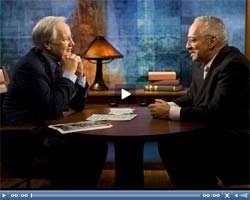Apr 28, 2008
 Over the last several days, I watched Rev. Jeremiah Wright in discussions of faith, theology, history, and culture on television. The three-plus hours I devoted to PBS and CNN amounted to some of the most sophisticated and thoughtful programming on American culture and racial issues that any news station has offered in recent years. And, for those who really listened to Rev. Wright, he moved from [...]
Over the last several days, I watched Rev. Jeremiah Wright in discussions of faith, theology, history, and culture on television. The three-plus hours I devoted to PBS and CNN amounted to some of the most sophisticated and thoughtful programming on American culture and racial issues that any news station has offered in recent years. And, for those who really listened to Rev. Wright, he moved from [...]
Read the Full Article

Already a subscriber? Login